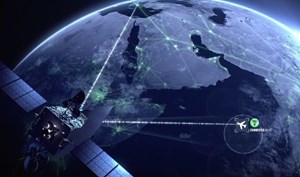K
Kathleen Martin
Guest
Research by Inmarsat, a global, mobile satellite communications company, reveals relatively few businesses derive maximum benefit from the Internet of Things (IoT) data that they gather.

Most of today’s businesses only share IoT data within their own organizations, with security and privacy concerns preventing them from disseminating it to organizations in their wider supply chains. Infrequent data collection and lacking an IoT data strategy leaves many businesses surveyed struggling to extract full value from their IoT data.
A more strategic, ambitious and open approach to gathering and sharing non-sensitive data could unlock substantial benefits for business struggling to make the most of IoT projects.
Collecting and sharing the right data at the right time enables companies and their partners to take better, more proactive decisions across the value chain to optimise operations as soon as a problem occurs, or even anticipate and mitigate it before it happens. Such data driven insight can help businesses reduce waste, increase productivity, improve customer service and run more sustainable operations.
The research was based on the interviews of 450 global respondents across the agriculture, electrical utilities, mining, oil and gas, and transport and logistics sectors. According to the research, of those who worked in oil and gas, as many as 89% of respondents admit their organization does not use the data collected from IoT projects as effectively as it could.
This is despite high levels of IoT adoption overall. The most prevalent barriers are security and data privacy concerns, cited as a barrier by over half (53%) of all respondents, closely followed by a lag between data collection and availability (52%) and followed by the lack of an IoT data strategy (34%).
Accelerating IoT adoption over the course of the Covid-19 pandemic has highlighted the fact that many businesses’ data sharing strategies are not yet as advanced as they need to be. Currently, only 16% of all oil and gas organizations make non-sensitive IoT data available to anyone in their organization, and to their partners, to access and to use. Conversely, just over two in five (43%) limit the use of IoT data to certain departments involved in their IoT projects. However, this is set to change, with a larger proportion of oil and gas organizations (41%) shifting towards sharing data with their wider supply chain and far fewer (16%) planning on limiting IoT data to specific departments. This change is occurring as more businesses come to understand that the responsible and secure sharing of IoT data is a necessary step towards unlocking the maximum value of that data.
The research reveals that having a formal IoT data strategy is a vital step towards drawing the optimum benefits from the technology, ensuring data is produced, shared, and analysed between the right parties at the right time. Oil and gas organizations with a formal IoT strategy are far more likely to gather data points in their IoT projects in real time (68% of respondents compared to only 15% amongst organizations without an IoT strategy).
Continue reading: https://www.worldoil.com/news/2022/2/24/security-and-privacy-concerns-prevent-effective-use-of-iot-data-inmarsat-research-shows/

Most of today’s businesses only share IoT data within their own organizations, with security and privacy concerns preventing them from disseminating it to organizations in their wider supply chains. Infrequent data collection and lacking an IoT data strategy leaves many businesses surveyed struggling to extract full value from their IoT data.
A more strategic, ambitious and open approach to gathering and sharing non-sensitive data could unlock substantial benefits for business struggling to make the most of IoT projects.
Collecting and sharing the right data at the right time enables companies and their partners to take better, more proactive decisions across the value chain to optimise operations as soon as a problem occurs, or even anticipate and mitigate it before it happens. Such data driven insight can help businesses reduce waste, increase productivity, improve customer service and run more sustainable operations.
The research was based on the interviews of 450 global respondents across the agriculture, electrical utilities, mining, oil and gas, and transport and logistics sectors. According to the research, of those who worked in oil and gas, as many as 89% of respondents admit their organization does not use the data collected from IoT projects as effectively as it could.
This is despite high levels of IoT adoption overall. The most prevalent barriers are security and data privacy concerns, cited as a barrier by over half (53%) of all respondents, closely followed by a lag between data collection and availability (52%) and followed by the lack of an IoT data strategy (34%).
Accelerating IoT adoption over the course of the Covid-19 pandemic has highlighted the fact that many businesses’ data sharing strategies are not yet as advanced as they need to be. Currently, only 16% of all oil and gas organizations make non-sensitive IoT data available to anyone in their organization, and to their partners, to access and to use. Conversely, just over two in five (43%) limit the use of IoT data to certain departments involved in their IoT projects. However, this is set to change, with a larger proportion of oil and gas organizations (41%) shifting towards sharing data with their wider supply chain and far fewer (16%) planning on limiting IoT data to specific departments. This change is occurring as more businesses come to understand that the responsible and secure sharing of IoT data is a necessary step towards unlocking the maximum value of that data.
The research reveals that having a formal IoT data strategy is a vital step towards drawing the optimum benefits from the technology, ensuring data is produced, shared, and analysed between the right parties at the right time. Oil and gas organizations with a formal IoT strategy are far more likely to gather data points in their IoT projects in real time (68% of respondents compared to only 15% amongst organizations without an IoT strategy).
Continue reading: https://www.worldoil.com/news/2022/2/24/security-and-privacy-concerns-prevent-effective-use-of-iot-data-inmarsat-research-shows/

